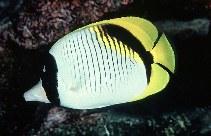| Family: |
Chaetodontidae (Butterflyfishes) |
| Max. size: |
30 cm TL (male/unsexed); max. reported age: 10 years |
| Environment: |
reef-associated; marine; depth range 2 - 171 m |
| Distribution: |
Indo-Pacific: Red Sea and East Africa to the Hawaiian, Marquesan, and Ducie islands, north to southern Japan, south to the Great Barrier Reef and Lord Howe Island. Throughout Micronesia. |
| Diagnosis: |
Dorsal spines (total): 12-12; Dorsal soft rays (total): 24-27; Anal spines: 3-3; Anal soft rays: 19-22. The dorsal caudal and anal fins are bright yellow. Body color is white with a black elliptical marking along the edge of the posterior portion of the back extending across the caudal peduncle to the base of the posterior anal fin rays. A series of thin vertical black lines run across the sides, and a prominent vertical black band runs across the eye (Ref. 4855). Snout length 2.0-2.7 in HL. Body depth 1.4-1.7 in SL (Ref. 90102). |
| Biology: |
Occur in lagoon and seaward reefs, usually in pairs in coral rich areas (Ref. 1602). Benthopelagic (Ref. 58302). Feed mainly on coral polyps and anemones, but also on small invertebrates and algae (Ref. 1602). Largest species in the genus (Ref. 9710). Oviparous (Ref. 205). Form pairs during breeding (Ref. 205). |
| IUCN Red List Status: |
Least Concern (LC); Date assessed: 08 October 2009 Ref. (130435)
|
| Threat to humans: |
harmless |
Source and more info: www.fishbase.org. For personal, classroom, and other internal use only. Not for publication.

